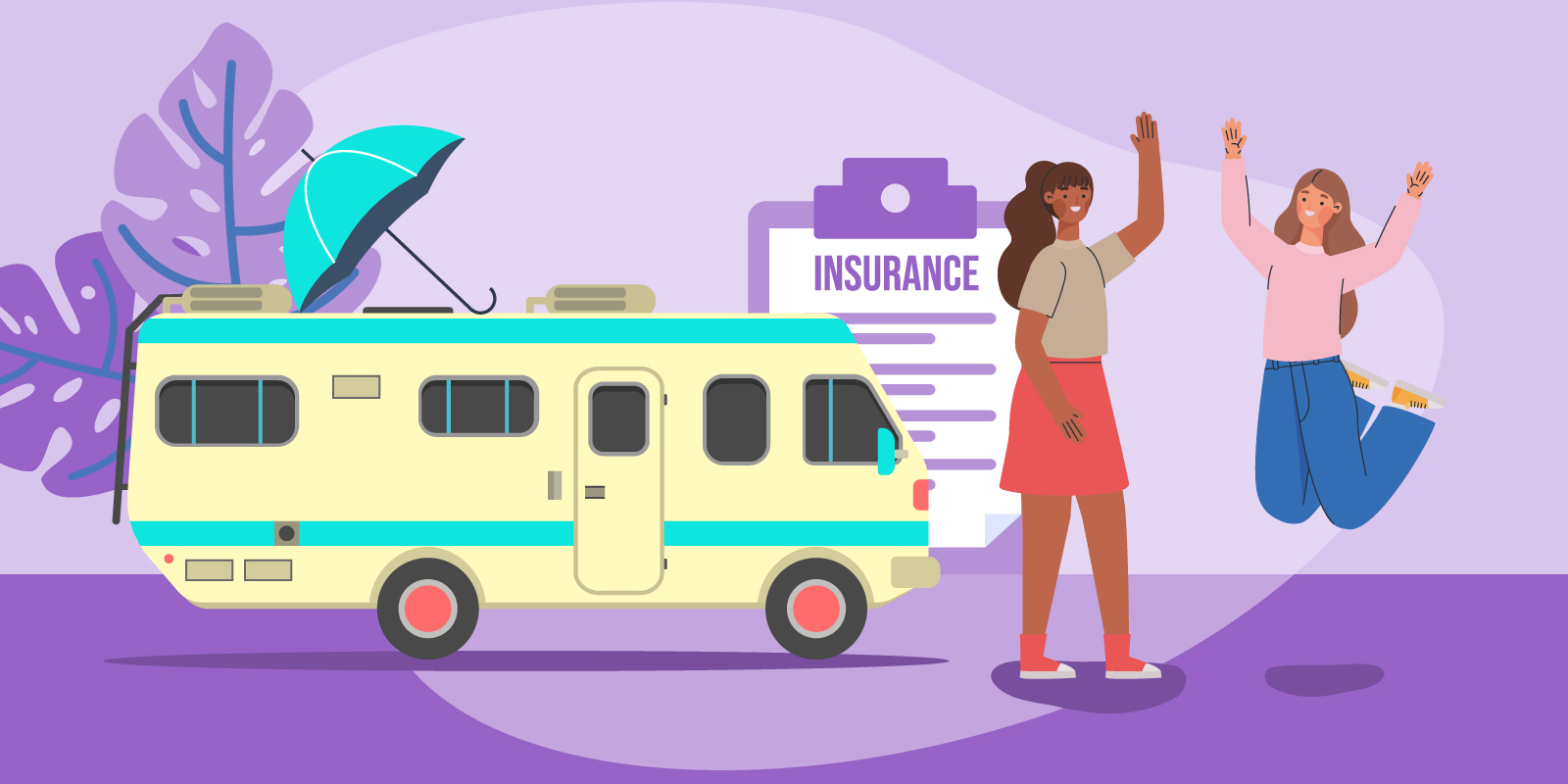Whether you’re just taking your camper van out for a weekend getaway or embarking on a cross-country road trip, it’s important to make sure your vehicle is properly insured. Here are a few tips on how to insure a camper van so you can hit the open road and embrace your inner outdoorsy side with peace of mind.
What’s A Camper Van?
A camper van is a type of vehicle that has been converted to provide both transportation and sleeping accommodations for travelers, sometimes referred to as a converted van. It typically includes a bed, storage space for personal belongings, and basic amenities such as a stove or sink. The size of a campervan can vary from small vans to larger vehicles with more extensive conversions. Custom DIY builds range from small minivans to large cargo vans.
Class B Motorhome
Unlike a traditional motorhome, a Class B motorhome is a type of recreational vehicle that is built on a van chassis. These vehicles are also commonly referred to as “camper vans.”
Class B motorhomes are typically smaller and more maneuverable than larger RVs, making them easier to navigate through cities and other tight spaces. Despite their smaller size, they still offer many of the same amenities found in larger RVs, such as sleeping accommodations, kitchenettes, and bathrooms.
Because of their compact size and versatility, Class B motorhomes are a popular choice for solo travelers or couples who want the freedom to travel without being tied down to a fixed location.
Popular campervan vehicles
There are several popular vehicles that are used for campervan conversions. Here are some of the most popular options.
- Mercedes-Benz Sprinter: This sprinter van is a favorite choice due to its spacious interior and durability.
- Ford Transit: The Ford Transit is another common option for campervans, with many people opting for the extended-length and 4WD version.
- Dodge Promaster: The Promaster has a front-wheel drive system which provides better traction in slippery conditions. It also has a high roof option which allows for more headroom.
- Volkswagen Vanagon: Although no longer in production, the Vanagon remains a popular choice due to its classic design and reliability.
Ultimately, the best vehicle for a DIY campervan conversion buildout depends on individual preferences and needs.
Work Out What Type Of Coverage You Need
It can be daunting trying to work out what type of camper van insurance you need to purchase, but it doesn’t have to be. Take a few moments to think about how you’ll use your camper van, where it will stay the majority of the time, and what sort of risks it might face; all this information can help shape the kind of camper van insurance policy that is most suitable for your needs. Consider the lengths you want to go to when protecting your camper van from any potential damage or theft, and make sure that these items are written into the terms of your camper van insurance policy.
With an understanding of the type of camper van coverage you require, finding a suitable camper van insurance provider should be relatively straightforward.
Choose The Right Insurance Provider

While camper vans are growing in popularity, there are some insurance companies that still won’t provide coverage for them. So, you’ll need to do some research to find out which providers offer the coverage that is right for you.
A good place to start is your current insurance agent. You might be able to get a discount by adding on insurance coverage for your campervan. But even if you have a current insurance policy, don’t overlook the importance of shopping around. A few phone calls could end up saving you hundreds of dollars!
5 Camper Van Insurance Providers To Consider
Common campervan insurance companies include the same insurance carriers as homeowners, renters and liability insurance providers. Here are a few companies to consider:
1. State Farm
State Farm offers RV insurance in addition to its other auto insurance products. RV policies can provide coverage for a variety of recreational vehicles, including motorhomes, travel trailers, and camper vans.
State Farm’s camper van policies typically include liability coverage, which protects you if you cause damage or injury to another person while driving your vehicle. They may also offer collision and comprehensive coverage, which can help pay for repairs or replacement if your vehicle is damaged in an accident or stolen.
If you’re interested in getting camper van insurance from State Farm, it’s best to contact a local agent who can help you find the right policy for your needs and budget.
Pros:
- Wide range of coverage options
- Discounts
- Local agents
- Roadside assistance
Cons:
- Potentially higher rates
- Limited coverage area
- Mixed customer reviews
2. National General Insurance
National General Insurance provides various types of insurance products to customers throughout the United States. The company was founded in 1920, and it has since grown to become one of the largest insurance providers in the country.
National General offers a wide range of insurance options, including auto insurance, home insurance, renters insurance, and more. They also offer specialty coverage options for things like boats and motorcycles.
National General Insurance also offers RV insurance for a variety of recreational vehicles, including motorhomes, travel trailers, and camper vans. Their policies typically include liability coverage, which protects you if you cause damage or injury to another person while driving your vehicle. You also have the option to add on comprehensive and collision protection.
One thing that sets National General apart from other insurance providers is their focus on providing customizable coverage options that can be tailored to meet the specific needs of each customer. They also offer various discounts and incentives to help customers save money on their premiums.
Pros:
- Competitive prices
- Wide range of coverage options
- User-friendly website and app for policyholders
Cons:
- Customer service can be slow to respond
- High deductibles on some policies
3. Progressive
Progressive Insurance was founded in 1937 and has since grown to become one of the largest auto insurers in the United States. It offers various types of coverage, including auto, home, renters, and more.
Progressive offers camper van insurance as part of its comprehensive RV insurance policies. Like the other options, a policy through Progressive will include liability in case you damage another person’s property. You’ll also have the option to add on full coverage, which includes comprehensive and collision protection.
Progressive is also known for its Snapshot program, which uses telematics technology to track a driver’s behavior behind the wheel. Customers who participate in this program can earn discounts on their insurance premiums based on safe driving habits.
Pros:
- Comprehensive coverage options with low premiums and deductibles.
- Claims process is straightforward and easy to use online and over the phone.
- Snapshot program can provide discounts for good driving
Cons:
- Premiums may increase significantly after filing a claim.
4. Safeco
Safeco Insurance is an American insurance company founded in 1923 and is headquartered in Seattle, Washington.
Safeco offers camper van insurance as part of its RV insurance policies with liability coverage that kicks in if you cause harm to another or their property and the optional add-ons of comprehensive and collision insurance to protect your car if it was damaged.
Safeco is known for its personalized approach to insurance, with policies that are tailored to meet the unique needs of each customer. They offer a variety of coverage options and discounts to help customers find the right policy at an affordable price.
One thing that sets Safeco apart from other insurance providers is its commitment to customer service. They have a team of knowledgeable agents who are available to answer questions and provide support throughout the claims process.
Pros:
- Low premiums with flexible payment plans available
- Extensive list of discounts, including multi-line and student discounts
Cons:
- Customer service can be slow to respond at times.
5. GEICO
Founded in 1936, GEICO Insurance provides coverage for automobiles, homes, renters, and more. The company is headquartered in Chevy Chase, Maryland.
They are known for their memorable advertising campaigns, and they offer a variety of discounts to help customers save money on their policies, including safe driver discounts, multi-policy discounts, and more.
GEICO offers campervan insurance as part of their RV insurance policies with the same general liability coverage (and comprehensive and collision insurance add-ons) as the other options on this list.
Overall, Geico is committed to providing affordable and customizable insurance options that meet the unique needs of each customer they serve.
Pros:
- Affordable policies with easy-to-use online platform and app
- Bundling option available, which allows customers to save money on multiple policies
Cons:
- Limited coverage options compared to other providers.
Three Steps To Insuring Your Camper Van
Ready to insure your camper van? Keep these tips in mind for a hassle-free experience.
1. Get Quotes and Compare Prices
When it comes to insurance, it pays to shop around. Getting insurance quotes from multiple providers and comparing prices can potentially save you hundreds, if not thousands of dollars down the road. It’s important to take the time to research insurance policies in order to find coverage that meets your needs and budget.
Common campervan insurance policies include roadside assistance, personal effects coverage, and vacation liability coverage.
2. Read the Small Print
Skimming insurance documents is easy to do, but when it comes to insurance options and auto policies, it pays to read the small print. All insurance companies offer different packages that come with a range of benefits and features, some of which you may have been unaware of until you read the fine details.
Also, don’t be afraid to ask questions. Not sure if the policy has collision coverage? Ask your agent. Does your insurance cover towing in Colorado? What happens if your personal property is stolen from the vehicle, but your van itself is alright? Your agent will be able to clarify any coverages or inclusions before you finalize your policy.
3. Print Out Your Proof of Insurance
Save yourself the hassle of digging through phone apps and ask for a printed copy of your proof of insurance right away.
FAQs
We’ve rounded up a few of the most commonly asked questions when it comes to camper van insurance policies.
What kinds of coverage do camper van insurance policies offer?
Camper van insurance policies typically offer coverage for physical damage to the vehicle, liability coverage, and medical payments. Some policies may also offer additional coverage like roadside assistance, theft protection and trip interruption insurance. If you want coverage for your personal property, you may have to purchase additional coverage.
Is there a difference between camper van and RV insurance?
For most companies, camper van insurance is part of their RV insurance. However, you will often enjoy lower premiums than traditional RVs.
What kind of discounts are available for camper van insurance?
Discounts for camper van insurance vary by provider, but some of the most common discounts include safety features discounts, multi-policy discounts and loyalty discounts. Some are also beginning to include safe driving discounts through monitored apps.
How much does camper van insurance cost?
The cost of camper van insurance depends on factors such as age, type of vehicle and driving history, so it’s best to get quotes from several providers before deciding on your policy.
How does the claims process work for camper van insurance?
When making a claim for camper van insurance, you’ll need to provide all the relevant details about the incident, including any reports or receipts that may help with the claims process, to your insurance company. Your insurer will then assess your claim and let you know what kind of payout you can expect. Local agents become especially helpful during the claim process as you will often interact directly with them.
Do I need additional liability coverage for my camper van?
Additional liability coverage is not always required when insuring a camper van, but it can be beneficial if you’re planning to go off-roading or travel in areas with high levels of traffic. Also, be sure to talk to your agent if you added anything out of the ordinary to your camper van build to make sure you don’t have any gaps in coverage.
Camper vans can provide the ideal way to explore the outdoors, live as a digital nomad full-time or simply embrace van life living, but it’s important to ensure you have adequate insurance coverage. Whether you have a self-built camper van or you are doing a long-term rental, take the time to compare different companies and select the right policy for your specific needs. Knowing the pros and cons of each company will help you make the best decision for your camper van insurance needs.
Related: What Is Covered When You Have Full Coverage Auto Insurance?





